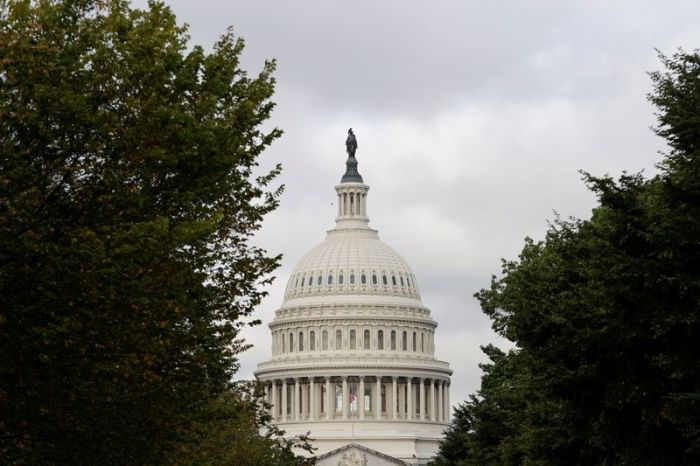(Reuters) – U.S. employment increased far less than expected in September amid a decline in government payrolls, but hiring could pick up in the months ahead as COVID-19 infections subside and people resume the search for work.
MARKET REACTION:
STOCKS: S&P e-mini futures initially dipped, but then recovered and were last up 0.2%.
BONDS: The yield on the benchmark 10-year note dipped and was last around 1.57%
FOREX: The dollar index fell and was last down 0.1%
COMMENTS:
GARRETT MELSON, PORTFOLIO STRATEGIST AT NATIXIS INVESTMENT MANAGERS SOLUTIONS, BOSTON
“The bottom line is that we’re certainly adding jobs here, probably not at the pace we’d like to see just yet.
“It’s not so much that the Fed’s on autopilot. It’s that they’ve been very clear and consistent that it’s pretty much time to start the tapering process. They’ve been telling markets it’s on the horizon for months now.”
“I really don’t think this changes the outlook for tapering. A weak print might change the pace but it doesn’t change the start date.”
KATHY LIEN, MANAGING DIRECTOR, BK ASSET MANAGEMENT, NEW YORK
“I think that the Federal Reserve made it very clear that they don’t need a blockbuster jobs report to taper in November, so while you’re seeing a little bit of a pullback in the dollar, I think the Fed remains on track.”
RUSSELL PRICE, CHIEF ECONOMIST, AMERIPRISE FINANCIAL SERVICES INC, TROY, MICHIGAN
“This is a stronger report than on first appearance. Sectors other than education still performed pretty well. Manufacturing had a good month despite all the supply constraints it continues to suffer. In fact, the motor vehicle sector dropped 6,000 jobs due to temporary layoffs and construction added 22,000. Even retail gained a strong 56,000.”
CARL TANNENBAUM, CHIEF ECONOMIST, NORTHERN TRUST, CHICAGO
“My take: the Fed was hoping for a number large enough so that their decision to begin tapering last month would be an easy one. Now, the discussions on November 2-3 may be more difficult; and the market will have to deal with some additional uncertainty.”
SAMEER SAMANA, SENIOR GLOBAL MARKET STRATEGIST AT WELLS FARGO INVESTMENT INSTITUTE, ST. LOUIS
“Payrolls data came in weaker than expected, but the overall trend of an improving labor market remains intact.”
“The internals also suggest some underlying strength with average weekly hours ticking up and wages staying firm.”
“The continued healing should continue to underpin consumption and economic growth.”
“We would continue to advise investors to get fully invested, favor stocks over bonds, and more cyclical sectors over defensive ones.”
MAZZEN ISSA, SENIOR FX STRATEGIST, TD SECURITIES, NEW YORK
“Wages were pretty firm, the unemployment rate dropped, but that came of the drop of the participation rate, so at the end of the day is it really going to change the Fed’s bias to deliver taper next month? No. We think they are pretty committed at this point to following through on that.
“I think in terms of the market reaction, at least on the rates side, it is perhaps a little bit more problematic for the long end, just given how we’ve traded in recent days.”
KATHY JONES, CHIEF FIXED INCOME STRATEGIST, SCHWAB CENTER FOR FINANCIAL RESEARCH, NEW YORK
“Obviously, the headline payroll number was on the soft side, but with the upward revisions to the previous two months, I would say it was a good enough report or a decent report to qualify for the Fed to start tapering.”
“It really doesn’t change the trajectory of where (the Treasury market is) going. We’ve had a steeper yield curve, rising yields, expectation for the Fed to start tightening sometime in 2022 — all that seems to be intact. I’m not seeing a huge enough change in the Treasury market to signal that people have changed their views.”
RYAN DETRICK, SENIOR MARKET STRATEGIST, LPL FINANCIAL, CHARLOTTE, NORTH CAROLINA:
“Tapering is likely still going to happen this year. This weak number doesn’t push the Fed to need to taper any sooner. It was a weak number, but it wasn’t a horrible number. Maybe a horrible number could have delayed the potential tapering but again, with other parts of the economy still rather healthy, tapering is likely on target for later this year still.
“October is historically very volatile. ..Today’s number is a disappointment, but I think most people expect probably will get a little higher revision in a month when we’re back here. Our take is near-term, expect the roller coaster to continue. Yes, we’ve avoided the debt ceiling concerns, but earnings start next week — that’s going to be extremely important.”
RICK MECKLER, PARTNER, CHERRY LANE INVESTMENTS, NEW VERNON, NEW JERSEY
“I think we’re in a strange place in terms of the market today. We have investor concern about rates rising too quickly. And we have investor concern about the economy being too weak. You know probably only one of those things is true.
“It has been true now for the last few years, that individual numbers, unless they’re extreme outliers, have no true effect on short term policy. I think the Fed has decided that the best course for keeping markets stable, is a very well telegraphed and consistent policy.
SCOTT ANDERSON, CHIEF ECONOMIST, BANK OF THE WEST, SAN FRANCISCO:
“I think it just barely clears Powell’s hurdle of “decent”. I still think a November taper announcement is still the most likely path for the Fed.
“The FOMC taper timing should not swing on only one economic data point. The Fed will take into consideration a broad cross-section of data, including inflation, wage growth, and labor shortage issues.”
SCOTT BROWN, CHIEF ECONOMIST, RAYMOND JAMES, ST. PETERSBURG, FLORIDA
“All in all it is still consistent with continued job growth overall. The Fed has cited sustained improvement in labor market for tapering. This adds to the cumulative evidence. It may not be as strong as we hoped but it is still showing signs of improvement.
“The markets really have a hard time looking beyond the headline number, but this is seasonally adjusted issue with education. It may still be a little disappointing, but it is only month.”
PETER CARDILLO, CHIEF MARKET ECONOMIST, SPARTAN CAPITAL SECURITIES, NEW YORK
“These numbers are disappointing. The falling (labor market) participation rate explains why the unemployment rate dropped. But the bottom line is this is weak data.
“This is a disappointing number and it’s being accompanied by higher wage costs and that’s pointing to higher wage inflation down the road. It’s not likely to derail the Fed’s tapering.”
SHAWN CRUZ, SENIOR MARKET STRATEGIST AT TD AMERITRADE IN JERSEY CITY, NEW JERSEY
“I don’t know that this really puts the Fed in a very good spot for having a clear-cut way to go out there and start tightening policy, at least the way this report is looking. The one caveat that could come with this report is the survey week is early September and that is where we were still having some pretty major concerns with the Delta variant.”
(Compliled by the global Finance & Markets Breaking News team)

























